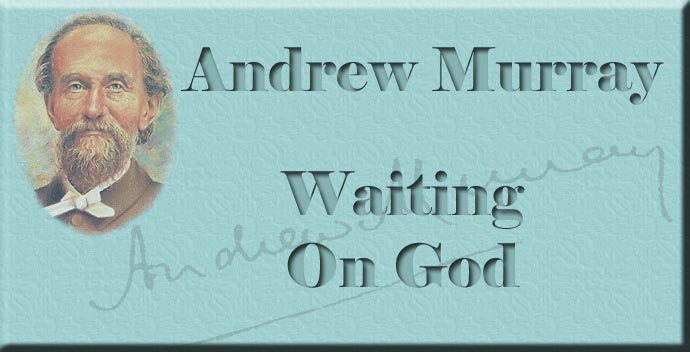
Waiting On God
By Andrew Murray
Day 7
A PLEA IN PRAYER
For the third time in this psalm we have the word wait. As before in verse 5, "On Thee do I wait all the day," so here, too, the believing supplicant appeals to God to remember that he is waiting on Him, looking for an answer. It is a great thing for a soul not only to wait upon God, but to be filled with such a consciousness that its whole spirit and position is that of a waiting one, that it can, in childlike confidence, say, Lord! Thou knowest, I wait on Thee. It will prove a mighty plea in prayer, giving ever-increasing boldness of expectation to claim the promise, "They that wait on Me shall not be ashamed!" The prayer in connection with which the plea is put forth here is one of great importance in the spiritual life. If we draw nigh to God, it must be with a true heart. There must be perfect integrity, whole-heartedness, in our dealing with God. As we read in the next Psalm (26:1, 11). "Judge me, O Lord, for I have walked in mine integrity," "As for me, I walk in my integrity," there must be perfect uprightness or single-heartedness before God, as it is written, "His righteousness is for the upright in heart." The soul must know that it allows nothing sinful, nothing doubtful; if it is indeed to meet the Holy One, and receive His full blessing, it must be with a heart wholly and singly given up to His will. The whole spirit that animates us in the waiting must be, "Let integrity and uprightness" - Thou seest that I desire to come so to Thee, Thou knowest I am looking to Thee to work them perfectly in me; - let them "preserve me, for I wait on Thee." And if at our first attempt truly to live the life of fully and always waiting on God, we begin to discover how much that perfect integrity is wanting, this will just be one of the blessings which the waiting was meant to work. A soul cannot seek close fellowship with God, or attain the abiding consciousness of waiting on Him all the day, without a very honest and entire surrender to all His will. "For I wait on Thee": it is not only in connection with the prayer of our text but with every prayer that this plea may be used. To use it often will be a great blessing to ourselves. Let us therefore study the words well until we know all their bearings. It must be clear to us what we are waiting for. There may be very different things. It may be waiting for God in our times of prayer to take his place as God, and to work in us the sense of HIS holy presence and nearness. It may be a special petition, to which we are expecting an answer. It may be our whole inner life, in which we are on the lookout for Godís putting forth of His power. It may be the whole state of His Church and saints, or some part of His work, for which our eyes are ever toward Him. It is good that we sometimes count up to ourselves exactly what the things are we are waiting for, and as we say definitely of each of them, "On Thee do I wait," we shall be emboldened to claim the answer, "For on Thee do I wait." It must also be clear to us, on Whom we are waiting. Not an idol, a God of whom we have made an image by our conceptions of what He is. No, but the living God, such as He really is in His great glory, His infinite holiness, His power, wisdom, and goodness, in His love and nearness. It is the presence of a beloved or a dreaded master that wakens up the whole attention of the servant who waits on him. It is the presence of God, as He can in Christ by His Holy Spirit make Himself known, and keep the soul under its covering and shadow, that will waken and strengthen the true waiting spirit. Let us be still and wait and worship till we know how near He is, and then say, "On Thee do I wait." And then, let it be very clear, too, that we are waiting. Let that become so much our consciousness that the utterance comes spontaneously, "On Thee I do wait all the day; I wait on Thee." This will indeed imply sacrifice and separation, a soul entirely given up to God as its all, its only joy. This waiting on God has hardly yet been acknowledged as the only true Christianity. And yet, if it be true that God alone is goodness and joy and love; if it be true that our highest blessedness is in having as much of God as we can; if it be true that Christ has redeemed us wholly for God, and made a life of continual abiding in His presence possible, nothing less ought to satisfy than to be ever breathing this blessed atmosphere, "I wait on Thee." "My soul, wait thou only on God!" |
|
 |
 |
|
|
|
-
Site Navigation
 Home
Home What's New
What's New Bible
Bible Photos
Photos Hiking
Hiking E-Books
E-Books Genealogy
Genealogy Profile
Free Plug-ins You May Need
Profile
Free Plug-ins You May Need
 Get
Java
Get
Java.png) Get Flash
Get Flash Get
7-Zip
Get
7-Zip Get Acrobat Reader
Get Acrobat Reader Get
TheWORD
Get
TheWORD